The UK will buy up to 7,000 long-range missiles, rockets and drones and build at least six weapons factories in a £6bn push to rearm at a time of growing threats.
The plan, announced by the government over the weekend, will form part of Sir Keir Starmer’s long-awaited Strategic Defence Review, which will be published on Monday.
However, it lacks key details, including when the first arms plant will be built, when the first missile will be made, or even what kind of missiles, drones and rockets will be purchased.
The government is yet to appoint a new senior leader to take on the job of “national armaments director”, who will oversee the whole effort.
Andy Start, the incumbent head of Defence Equipment and Support – the branch of defence charged with buying kit – is still doing the beefed-up role of national armaments director as a sluggish process to recruit someone externally rumbles on.
Revealing some of its content ahead of time, the Ministry of Defence said the defence review will recommend an “always on” production capacity for munitions, drawing on lessons learned from Ukraine, which has demonstrated the vital importance of large production lines.
It will also call for an increase in stockpiles of munitions – something that is vitally needed for the army, Royal Navy and Royal Air Force to be able to keep fighting beyond a few days.
Some £1.5bn will be invested in the new factories, the government said. It said this additional funding will lift total expenditure on munitions to £6bn this parliament.
The UK used to have a far more resilient defence industry during the Cold War, with the capacity to manufacture missiles and other weapons and ammunition at speed and at scale.
However, much of that depth, which costs money to sustain, was lost following the collapse of the Soviet Union in 1991, when successive governments switched funding priorities away from defence and into areas such as health, welfare and economic growth.
Even after Russia’s full-scale invasion of Ukraine in 2022 and a huge increase in demand from Kyiv for munitions from its allies, production lines at UK factories were slow to expand.
Under this new initiative, the government said the UK will build at least six new “munitions and energetics” factories.
Energetic materials include explosives, propellants and pyrotechnics, which are required in the manufacturing of weapons.
There were no details, however, on whether these will be national factories or built in partnership with defence companies, or a timeline for this to happen.
There was also no information on where they would be located or what kind of weapons they would make.
It is understood these weapons will include a mix of missiles, rockets and drones.
Sources within the defence industry criticised the lack of detail, which is so often the case with announcements by the Ministry of Defence.
The sources said small and medium-sized companies in particular are struggling to survive as they await clarity from the Ministry of Defence over a range of different contracts.
One source described a sense of “paralysis”.
The prime minister launched the defence review last July, almost a year ago. But there had been a sense of drift within the Ministry of Defence beforehand, in the run-up to last year’s general election.
The source said: “While the government’s intentions are laudable, the lack of detail in this announcement is indicative of how we treat defence in this country.
As well as rearming the nation, the government said the investment in new factories and weapons would create around 1,800 jobs across the UK.





